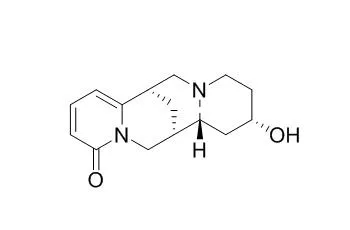| In vitro: |
| Fitoterapia. 2006 Dec;77(7-8):595-7. | | Cytotoxic constituents from Anagyris foetida leaves.[Pubmed: 16887297 ] | Anagyris foetida extracts were investigated in preliminary cytotoxic tests against two tumour cell lines.
METHODS AND RESULTS:
Chromatographic separations on active extracts led to the isolation of two alkaloids, anagyrine (1) and Baptifoline (2), as well of isorhamnetin (3) and syringin 4-O-beta-D-glucopyranoside (4). In vitro cytotoxicity of compounds 1-3 was also evaluated. | | Pharmaceutical Biology, 2009, 47(1):81-85. | | GC-MS analysis and antimicrobial activity of alkaloid extract from Genista vuralii[Reference: WebLink] | In the present study, the alkaloid composition of the aerial parts of Genista vuralii A. Duran & H. Dural (Fabaceae) was investigated by capillary GC-MS.
METHODS AND RESULTS:
Ten quinolizidine alkaloids were identified by capillary GC-MS, namely, N-methylcytisine, cytisine, tetrahydrorhombifoline, 17-oxosparteine, 5,6-dehydrolupanine, lupanine, 17-oxolupanine, anagyrine, Baptifoline, and 13α-tigloyloxylupanine. Among them, anagyrine (93.04%) was the most abundant alkaloid. Furthermore, antibacterial and antifungal activities of the alkaloid extract of G. vuralii were tested against standard strains of bacteria (Escherichia coli, Pseudomonas aeruginosa, Bacillus subtilis, Staphylococcus aureus) as well as fungi (Candida albicans, Candida krusei). The alkaloid extract of G. vuralii presented good activity against S. aureus, B. subtilis, and C. krusei, with minimum inhibitory concentrations (MIC) of 62.5 μg/mL. The remaining MIC values were found to range between 125 and 500 μg/mL.
CONCLUSIONS:
To the best of our knowledge, the current work is the first to report the alkaloid profile and antimicrobial activity of G. vuralii L. growing in Turkey. |
|






 Cell. 2018 Jan 11;172(1-2):249-261.e12. doi: 10.1016/j.cell.2017.12.019.IF=36.216(2019)
Cell. 2018 Jan 11;172(1-2):249-261.e12. doi: 10.1016/j.cell.2017.12.019.IF=36.216(2019) Cell Metab. 2020 Mar 3;31(3):534-548.e5. doi: 10.1016/j.cmet.2020.01.002.IF=22.415(2019)
Cell Metab. 2020 Mar 3;31(3):534-548.e5. doi: 10.1016/j.cmet.2020.01.002.IF=22.415(2019) Mol Cell. 2017 Nov 16;68(4):673-685.e6. doi: 10.1016/j.molcel.2017.10.022.IF=14.548(2019)
Mol Cell. 2017 Nov 16;68(4):673-685.e6. doi: 10.1016/j.molcel.2017.10.022.IF=14.548(2019)